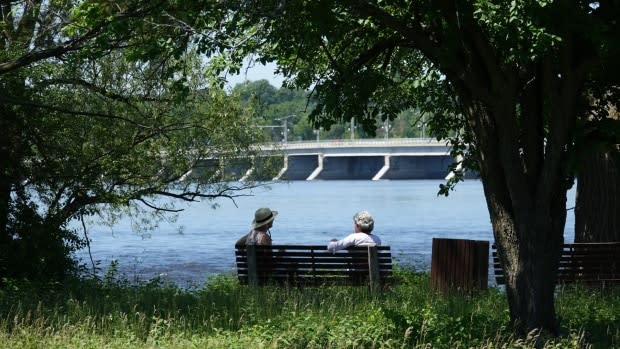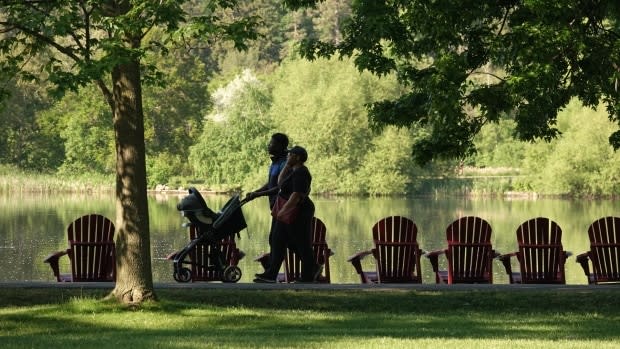What you need to know about COVID-19 in Ottawa on Thursday, June 18

Recent developments:
There are now seven people with COVID-19 in Ottawa hospitals, the lowest number of hospitalizations since late March.
The federal government is directing more than $25 million to help national museums recover from the pandemic.
What's the latest?
Starting Monday, Quebec is getting rid of physical distancing rules at daycares between children in the same group, allowing more shared toys and lifting capacity limits.
According to Ottawa Public Health's latest COVID-19 report, there are just seven people currently hospitalized with the respiratory illness, the lowest number since March 25. None of those patients is in an intensive care unit.
A voluntary contact tracing app to help clamp down on novel coronavirus outbreaks will be tested in Ontario, the federal government announced Thursday. The goal is to launch it July 2.
The federal government is also directing $25.7 million to national museums, including those in Ottawa and Gatineau, to help them weather the pandemic and get ready to reopen.
WATCH: Camera captures care home residents wandering into room during outbreak
MEDIA]
How many cases are there?
There have been 2,043 confirmed cases of COVID-19 in Ottawa and 260 deaths.
There are more than 3,250 known cases across eastern Ontario and western Quebec.
More than 2,700 people in the region have recovered from COVID-19.
COVID-19 has killed 101 people outside Ottawa: 52 in Leeds, Grenville and Lanark counties, 17 in other parts of eastern Ontario and 32 in the Outaouais.
What's open and closed?
Starting today Ontario care homes have relaxed visitor restrictions and the ByWard and Parkdale markets are open again.
Eastern Ontario entered "Stage 2" of the province's recovery plan last week, allowing "circles" of up to 10 people who don't have to distance as long as they limit close contact to that group.
Quebec also has different restrictions for different regions and plans to allow indoor, distanced gatherings of up to 50 people next week.
That includes indoor sports venues such as arenas and pools. Beaches are allowed to open as of Monday.
Kingston starts closing parts of some downtown streets next week to offer more space for businesses and pedestrians.
Ontario Parks says it's ready to begin opening some campsites and services starting next week.
Quebec's back-to-school plans bring older students to classrooms again. Post-secondary schools are moving toward more online classes in September, with Ontario promising a plan for younger students by July.
Distancing and isolating
The coronavirus primarily spreads through droplets when an infected person coughs or sneezes. People don't need to have symptoms to be contagious.
That means physical distancing measures such as working from home and in Ontario, staying at least two metres away from anyone they don't live with or have in their circle.

Children in Quebec can now be one metre apart at school and day camps. Starting next week, all Quebecers can be within 1.5 metres of each other while seated at indoor venues such as theatres.
Ottawa Public Health now wants people to think about how to safely do certain things and recommends people wear a fabric or non-medical mask when they can't always stay two metres from strangers, such as at a grocery store.

Anyone who has symptoms or travelled recently outside Canada must self-isolate for at least 14 days.
Specifically in Ottawa, anyone waiting for a COVID-19 test result must self-isolate at least until they know the result.
The same goes for anyone in Ontario who's been in contact with someone who's tested positive or is presumed to have COVID-19.
People 70 and older or with compromised immune systems or underlying health conditions should also self-isolate.
What are the symptoms of COVID-19?
COVID-19 can range from a cold-like illness to a severe lung infection, with common symptoms including fever, a dry cough, vomiting and the loss of taste or smell.
Less common symptoms include chills, headaches and pink eye. The Ontario government says in rare cases, children can develop a rash.
If you have severe symptoms, call 911.
Where to get tested
In eastern Ontario:
In Ottawa any resident who feels they need a test, even if they are not showing symptoms, can now be tested at one of three sites.
Inuit in Ottawa can call the Akausivik Inuit Family Health Team at 613-740-0999 for service, including testing, in Inuktitut or English on weekdays.
WATCH: How the new Bluesfest and NAC drive-in works
Testing has also expanded for local residents and employees who work in the Eastern Ontario Health Unit area.
There is a drive-thru test centre in Casselman and assessment centres in Hawkesbury and Winchester that don't require people to call ahead.
Others in Rockland and Cornwall require an appointment.
In Kingston, the assessment centre at the Kingston Memorial Centre is open seven days a week for walk-ins. Napanee's test centre is open daily for people who call for an appointment.
WATCH: Hospital experts say Ontario students can safely return in September
The Leeds, Grenville and Lanark unit asks you to get tested if you have a symptom or concerns about exposure.
It has a walk-in site in Brockville open seven days a week at the Memorial Centre and testing sites in Smiths Falls and Almonte which require an appointment.
WATCH: Small town turns ghost town
The public health unit in the Belleville area is asking people to call it, their family doctor or Telehealth if they have symptoms or questions.
You can arrange a test in Bancroft, Belleville or Trenton by calling the centre, or in Picton by texting or calling 613-813-6864.
There are weekly pop-up clinics in other communities and you may also qualify for a home test.
Renfrew County is also providing pop-up and home testing under some circumstances. Residents without access to a family doctor can call 1-844-727-6404 if they have health questions, COVID-19-related or not.
If you're concerned about the coronavirus, take the self-assessment.
In western Quebec:
Outaouais residents should call 1-877 644-4545 if they have symptoms for further assistance.
First Nations:
Local communities have declared states of emergency, put in a curfew or both.
Akwesasne has opened a mobile COVID-19 test site available by appointment only. Anyone returning to Akwesasne who's been farther than 80 kilometres away is asked to self-isolate for 14 days.
Anyone in Tyendinaga who's interested in a test can call 613-967-3603 to talk to a nurse.
Pikwakanagan's council let businesses reopen May 29 and is not running checkpoints at entrances during the day.
For more information


